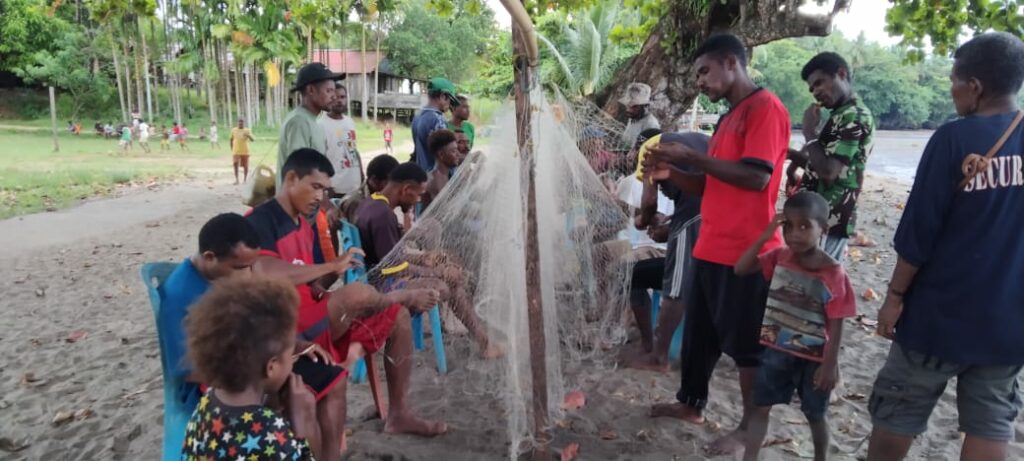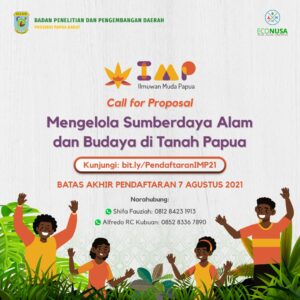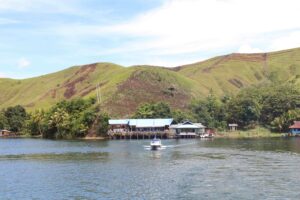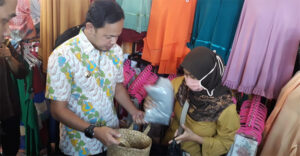
Waimon Village in the Segun District and Kasimle Village in the Seget District, Sorong, West Papua have rich maritime potential. Waimon village is a fishing base for banana shrimp (Fenneropenaeus merguiensis). In one day, each fleet operated by 2–3 fishermen can catch around 80–100 kilograms of shrimp. Banana shrimps in middle-man are valued for IDR 60,000 per kilogram.
Not only shrimps, people in these two villages often catch snappers, tilapias, groupers, baronang, and lobsters. They can catch up to 100 lobsters during half tide and clear water but on the contrary, they can only get 15 lobsters during strong currents and unclear water.
Nets are one of the tools that must be owned to catch these marine commodities. However, often the nets used by fishermen are damaged due to snagging in coral or wood. Because the community could not repair the nets, in the end the damaged nets were simply thrown away.
Read also: Fostering New Hope from Vanilla from Village School in Molof and Warlef, Keerom
Econusa Foundation supports local economic development in many ways, including capacity building. Through Village School in Waimon on 24-26 November 2022 and a Village School in Kasimle on 27-30 November 2022 programs, local fishermen were involved in a series of technical skills development classes. The Village School is part of the Eco-Involvement School program which aims to build village community resilience. This program began with the Village Head and Social Transformation School (STS) Workshop which was held in the Segun District in October 2022.
There were two classes taught at the Kampung Schools in Waimon and Kasimle, net repair class taught by Set Wambraw, a fisherman who has good net weaving skills, and an organic vegetable cultivation class given by EcoNusa Foundation Natural Resource Management staff, Utreks Hembring.
In Waimon Village around 20 fishermen participated in the net repair class. Meanwhile, 10 fishermen joined the same class in Kasimle Village. Set Wambrauw taught the steps for repairing the nets. In the first stage, prepare a broken net and spread it over the bamboo like drying clothes lengthwise. From there you will see the damaged parts.
Read also: Paniai Coffee Nominated as Finalist in Jakarta Coffee Week 2022
Then, the net holes are tidied up in a rectangle and then woven using a net needle. “Tidy up the messy knots of the net using scissors, then we draw the direction from which we are going without breaking the rope, then choose the direction we will start to insert the sewing needle and start by weaving the net on the torn part, keep doing it until the torn part of the net covered,” Set explained.
Meanwhile, the organic vegetable farming class in each village was attended by 11 people. Utreks taught the farming process from selecting good quality seeds, soaking the seeds, and planting and fertilizing techniques.
The head of the Village Consultative Organization (Bamuskam) of Kasimle, Moy, explained that the village funds support local farming with seed purchases. Unfortunately, due to a lack of farming and cultivating mentoring, most of the vegetables they have planted before have died. Thus it’s important for the local community to develop their farm as they have a potential market for local companies that show interest in buying their vegetables. “We hope that EcoNusa’s support in this village can help us. Local companies sometimes come and ask to buy vegetables for IDR 7.000 per bunch, but we don’t know what to do,” he said.
Read also: Handling Fishing Net of Hope in Segun Village
The Head of Kasimle Village, Moses Klawomon also asked the community to actively learn from EcoNusa’s team. “Don’t be lazy to plant vegetables, don’t steal people’s plants in the garden. You must work, plant it by yourself. We have EcoNusa’s staff in our village, you can ask what you want to ask,” said Moses.
The organic cultivation classes have increased communities of Waimon Village’s interest in farming. As an effort to maintain this farming activity, EcoNusa has initiated agricultural demonstration plots.
Both the Waimon Village Government and the Kasimle Village Government have asked for the continuation of the Village School in 2023. “There must be further activities and EcoNusa should not leave us alone. Continue to foster netting training and in the future, there should be other training such as agricultural training and others,” said Oktana, a resident of Waimon village.







